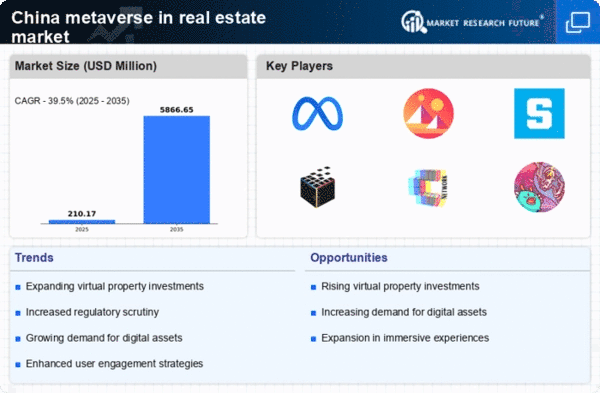Increased Demand for Digital Assets
The metaverse in-real-estate market is witnessing a notable increase in demand for digital assets, driven by a growing interest in virtual land and properties. As more individuals and businesses recognize the potential of owning virtual real estate, the market is expanding rapidly. In 2025, it is estimated that the value of virtual land in China could reach $5 billion, reflecting a significant shift in investment strategies. This trend is further fueled by the rise of digital currencies and blockchain technology, which provide secure and transparent transactions. Investors are increasingly viewing virtual properties as viable assets, akin to traditional real estate. This growing demand for digital assets is likely to propel the metaverse in-real-estate market to new heights, as more stakeholders enter the space seeking opportunities for growth and diversification.
Government Support for Digital Innovation
The metaverse in-real-estate market is benefiting from increased government support for digital innovation in China. The Chinese government has been actively promoting the development of digital economies, which includes initiatives aimed at enhancing the metaverse ecosystem. In 2025, government investments in digital infrastructure are expected to exceed $20 billion, fostering an environment conducive to the growth of virtual real estate. This support not only encourages technological advancements but also instills confidence among investors and developers in the metaverse in-real-estate market. As regulatory frameworks evolve to accommodate digital assets, the market is likely to see a surge in participation from both domestic and international players, further driving growth and innovation in the sector.
Rise of Social Interaction in Virtual Spaces
The metaverse in-real-estate market is increasingly influenced by the rise of social interaction in virtual spaces. As more individuals engage in online communities and social platforms, the demand for virtual properties that facilitate social experiences is growing. In 2025, it is projected that social virtual environments will account for over 30% of all virtual real estate transactions in China. This trend indicates a shift towards creating spaces that not only serve as investment opportunities but also enhance social connectivity. Developers are likely to focus on creating interactive and engaging virtual environments, which could lead to a more vibrant metaverse in-real-estate market. The emphasis on social interaction may also attract a diverse range of users, from gamers to professionals, further expanding the market's reach.
Technological Advancements in Virtual Reality
The metaverse in-real-estate market is experiencing a surge due to rapid technological advancements in virtual reality (VR). Enhanced VR technologies allow users to explore properties in immersive environments, which could lead to increased engagement and interest in virtual real estate. In 2025, the VR market in China is projected to reach approximately $10 billion, indicating a robust growth trajectory. This technological evolution not only enhances user experience but also facilitates virtual property transactions, making it easier for investors to navigate the metaverse in-real-estate market. As VR becomes more accessible, it is likely to attract a broader audience, including younger generations who are more inclined to invest in digital assets. Consequently, the integration of advanced VR technologies is a key driver shaping the future of the metaverse in-real-estate market.
Integration of E-commerce in Virtual Real Estate
The metaverse in-real-estate market is poised for growth through the integration of e-commerce within virtual environments. As online shopping continues to evolve, virtual real estate is becoming a platform for brands to establish immersive shopping experiences. In 2025, it is anticipated that e-commerce transactions within virtual spaces will reach $15 billion in China, highlighting the potential for commercial opportunities in the metaverse. This integration allows businesses to create unique storefronts and engage customers in innovative ways, thereby driving demand for virtual properties. As more retailers recognize the benefits of establishing a presence in the metaverse, the market for virtual real estate is likely to expand significantly, creating new avenues for investment and development.

















